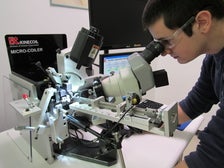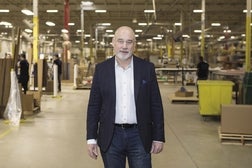Employers caution against $15 minimum wage
 Antonio Caban/SHNS
Gov. Charlie Baker wants to see how the new $11 minimum wage will impact the economy before the state moves toward another increase.
Antonio Caban/SHNS
Gov. Charlie Baker wants to see how the new $11 minimum wage will impact the economy before the state moves toward another increase.
Raising the state's minimum wage to $15 an hour would increase costs for about 70 percent of Massachusetts businesses, forcing some to hold off on hiring or consider moving elsewhere, two surveys conducted by the Associated Industries of Massachusetts found.
The minimum wage in Massachusetts rose one dollar to $11 an hour on Jan. 1, and low-wage workers operating in a low unemployment environment are poised to press for passage in 2017 of legislation boosting the wage floor to $15 an hour.
Conducted last month, the surveys of businesses found that 13 percent of companies employed workers at the former minimum wage of $10 an hour and another 24 percent pay employees between $10 and $15 an hour.
Thirty-four percent of the businesses that responded to the AIM surveys said they pay employees slightly more than $15 an hour, but would have to increase pay to deal with wage compression if the state wage floor is raised.
"While we are empathetic with the challenges facing lower wage staff, it is also the case that we will employ fewer hourly employees at higher minimum wages," an unnamed business executive wrote in response to AIM's survey. "Each dollar increase costs our company $1.5 million per year."
Another employer said a $15 an hour minimum wage would be "too much for the small business community to absorb," and advised the Legislature instead to "concentrate on cutting costs and make Massachusetts a more affordable place to live."
The Raise Up Massachusetts coalition of unions, community and religious groups and low-wage workers plans to push for a statewide $15 an hour wage floor during the 2017-2018 session, with the increase phased in over several years. The raise would help ease income inequality in the state, advocates argue.
AIM, a business lobby with powerful influence on Beacon Hill, opposes the increase, saying, "raising the minimum wage to $15 per hour, while emotionally appealing and politically expedient, is an ineffective way to address income inequality."
The business group instead encouraged the Legislature to focus on improving education, access to vocational technical education, create high-tech coding academies and promoting structures that put people to work in areas of rapid economic growth.
If activists opt to pursue a 2018 minimum wage ballot question, the proposal could be paired up with a proposed constitutional amendment adding a 4 percent income surtax on household incomes above $1 million, a proposal aimed at generating about $2 billion for spending on transportation and education. Opponents of that levy say could lead to a graduated income tax structure featuring higher tax rates in future years based on income brackets.
Legislative leaders were receptive but not necessarily supportive when Raise Up Massachusetts held a State House rally in November to announce its push for a $15 an hour wage. Senate President Stanley Rosenberg attended the rally, but his office did not make him available to speak with reporters. An aide to House Speaker Robert DeLeo said the bill, when filed, will go through the typical vetting process.
Gov. Charlie Baker and Lt. Gov. Karyn Polito have both said they want to see how the new $11 an hour minimum wage works before considering another hike.












0 Comments